Triage Blu-ray Movie
HomeTriage Blu-ray Movie 
National Entertainment Media | 2009 | 100 min | Rated R | Aug 10, 2010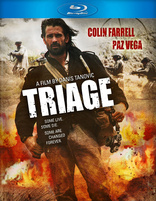
Movie rating
6.6 | / 10 |
Blu-ray rating
| Users | 3.2 | |
| Reviewer | 4.0 | |
| Overall | 3.9 |
Overview
Triage (2009)
After a traumatic near-death experience, Mark, a war photographer, returns home from Kurdistan without his friend and colleague David. As time goes on, it becomes clear that Mark holds the key to the truth of David’s disappearance.
Starring: Colin Farrell, Paz Vega, Christopher Lee, Kelly Reilly, Jamie SivesDirector: Danis Tanovic
| Drama | Uncertain |
| War | Uncertain |
Specifications
Video
Video codec: MPEG-4 AVC
Video resolution: 1080p
Aspect ratio: 2.35:1
Original aspect ratio: 2.39:1
Audio
English: DTS-HD Master Audio 5.1 (48kHz, 24-bit)
English: Dolby Digital 5.1 (448 kbps)
Subtitles
English, Spanish
Discs
25GB Blu-ray Disc
Single disc (1 BD)
Playback
Region A, B (C untested)
Review
Rating summary
| Movie | 4.0 | |
| Video | 4.0 | |
| Audio | 5.0 | |
| Extras | 3.0 | |
| Overall | 4.0 |
Triage Blu-ray Movie Review
War is hell.
Reviewed by Jeffrey Kauffman August 6, 2010“There is no pattern to who lives or dies in war. . .In war people die because they do. There is nothing more to it than that.”
Triage is a horrifying procedure, one which probably wasn’t known to many people outside of the medical and battle communities until it got a bit of tangential PR when the Vietnam War started making the nightly news airwaves, and then, a bit later, when such series as M*A*S*H dealt with it, however cursorily. Separating the treatable from the hopeless is an emotionally devastating process and one that puts the separator into the unenviable position of playing God. Who’s to say who might survive, despite the seriousness of their wounds? (In a somewhat comic sidebar, I once had triage applied unsuccessfully to me. I had broken my ankle and my wife dropped me off at the nearest emergency room, which, as it turned out, was the regional distribution center for Methadone. I sat idly by for hours in my wheelchair as a string of heroin addicts simply walked up and got their medication—they were deemed a higher priority than I was. I asked for an aspirin to help with the pain. “No,” said the curt ER admitting nurse, “not until a doctor has seen you.” “When will a doctor be able to see me?” I queried, by now about three hours into my painful ordeal. “It could be quite some time,” she brusquely responded, at which point I decided I’d try greener pastures at another ER. I called my wife, asked her to come pick me up, and informed the ER nurse I was leaving. As I hobbled out of the ER, she screamed after me, “OK, but I’m noting on your file that you’ve eloped triage!!” Eloped triage. The horror.) Triage the film takes an of course much grimmer look at this aspect of what might only charitably be called medical care, at least in the context of this film, which posits Colin Farrell as a late-80’s photojournalist caught up in the nightmare world of Kurdistan under attack from Saddam Hussein’s Iraq. The hapless patients there could probably only pray they were able to elope triage. While the film depicts the brutal insanity of a Kurdish field doctor without medicine or even really any basic tools of his trade, and the resultant horrors of the decisions he must make, the actual focus of the film is on Farrell’s character Mark Walsh, who is mysteriously wounded and returns to England in the throes of both a physical and mental breakdown.
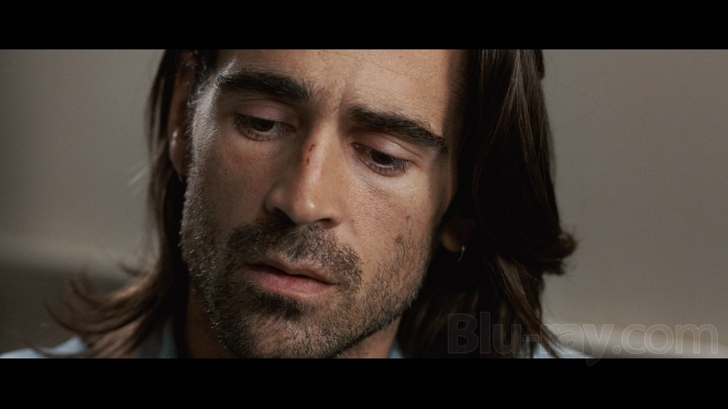
Colin Farrell stars as physically and emotionally wounded photojournalist Mark Walsh.
War photographers are an odd breed to begin with (as the film deals with rather blatantly), a mix of bravado and dissociation which makes them able to get up close and personal with their cameras while supposedly never reaping the emotional trauma that such intimacy might incur. In fact about three quarters of the way through this film, after Walsh has returned home, a physical and mental wreck, and is put under the care of his girlfriend’s famous psychoanalyst grandfather (Christopher Lee), Lee’s character Dr. Morales confronts Walsh about his use of his camera as a “filter” for horrific experiences. These include haunting memories Walsh carries around, nightmares including a Robert Capa-esque moment of a Beirut youth being shot right in front of Walsh’s eyes, with Walsh’s response simply being to get a good shot (no pun intended) of the kid dying. Though Walsh is surrounded by a loving partner (the gorgeous Paz Vega, who could easily be the next Penelope Cruz), and a network of friends (including his cohort David, played by Jamie Sives, who disappears in Kurdistan, leading to at least part of Walsh’s breakdown), Walsh is a remote presence, one burying his fears and visions to the point where he becomes psychosomatically paralyzed.
Triage is an emotionally devastating piece which provides a showcase for Farrell’s soulful acting. Farrell is in fact an actor who seems to carry the entire dolefulness of the Irish spirit within his two deep and wounded, incredibly mournful eyes. That serves the character of Walsh very well here, despite the film’s sometimes faltering attempts at psychobabble and cathartic breakthroughs. One of Triage’s writing downfalls is that is posits, or at least hints at, Walsh being amnesiac about what really happened to him in Kurdistan, and yet that evidently turns out not to be the case. When the truth is revealed about what actually happened to Walsh and his buddy David, it’s a shocking moment, but one that seems oddly dissociative itself, since Walsh has been suppressing discussion about the incident, not actually suffering from some sort of psychological memory block.
What Triage makes horrifyingly clear is the unbelievably harsh conditions of battle in this war-torn region. The scenes with Walsh and the Kurdish Dr. Talzani (Branko Djuric) are almost unbearable to watch, as the physician moves through a dimly lit cave full of hideously wounded locals, deciding in a flash who is going to get at least some attempt at treatment. A yellow slip of paper, and the patient might be saved. A blue one, and there’s simply no hope. The actual ultimate fate of the blue-slipped wounded is as horrifying as anything that may have happened to them in battle. Through it all, Walsh is there with his camera, a tool he utilizes actually more like a shield than a filter, holding it up between himself and a desperately crying man who’s just received the blue slip of death.
Director-screenwriter Danis Tanovic helms a disturbing production which has several tour de force directorial moments. The opening scene, where we see Farrell staring blankly toward the camera as blood oozes from his head, is just one remarkable example. The viewer is suddenly confronted right off the bat with a number of questions, not the least of which is, is the leading actor already dead? As the camera pans back and twists slights, a few blinks of Farrell’s eyes let us know he’s at least alive, if not in the best of health. Later, two unexpected moments of battle almost erupt out of the screen in Triage, leaving the viewer gasping for breath as the shock (if not the awe) of being in the midst of such death and destruction is brought home to bear in a very distressing manner.
Performances here are all top notch, with Farrell delivering a sad and quiet depiction of a man unable to fully come to grips with his own personal triage. The supporting cast is also uniformly excellent, with Vega seemingly on the verge of a major breakthrough into United States film. While some of the tangential backstory between Vega’s Elena and her grandfather is just silly and overwrought, Vega and Lee do fine work in their relatively brief moments together. Lee is nicely understated, seeming almost to channel a Max von Sydow-ish quality, and he’s good for a laugh or two as he repeatedly turns the lights on on a sleeping Farrell, then exclaiming, “Ah! So you’re awake!”
If Triage never quite makes a compelling psychological case for the main issue confronting Walsh, it nonetheless offers one of the most harrowing depictions of the horrific effects of battle seen in recent war movies. As the film states in its own somewhat ironic textual epitaph (ascribed to Plato), “It is only the dead who have seen the end to war.”
Triage Blu-ray Movie, Video Quality 
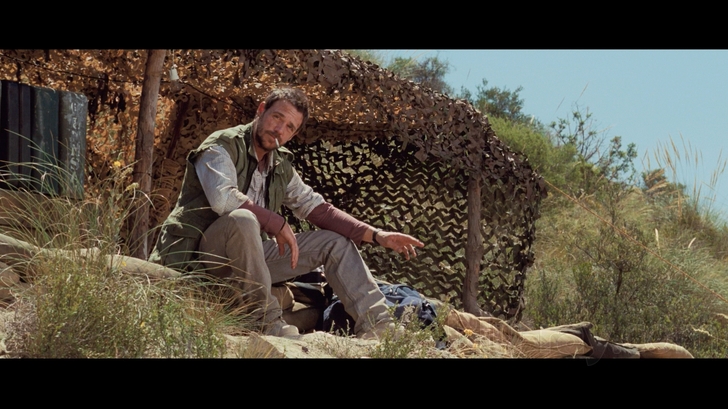
Triage arrives on Blu-ray with a very good AVC encoded 1080p image in a 2.35:1 aspect ratio. This is a gritty, dusty and somewhat blanched looking film, by design. That said, the image quality here is for the most part very sharp and detailed, with only some minor digital noise in some desert scenes (and one very brief moment of aliasing on a wall radiator, of all things) as the sole artifacts to contend with. Colors, though often drab and tilted toward the yellow-brown side of things (at least in the dusty desert segments), are accurate and depth of field in the location footage is quite astounding at times. Contrast and black levels are very good throughout, and once the film returns to an urban setting, there's excellent detail even in the often drably lit scenes.
Triage Blu-ray Movie, Audio Quality 
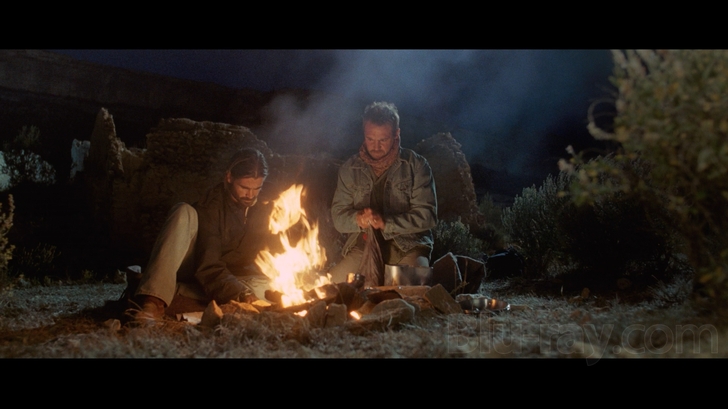
There are at least two moments in Triage when the astoundingly robust DTS-HD Master Audio 5.1 track is going to astound, if not outright shock, the listener. I don't want to spoil either of these moments for you, but suffice it to say, if you're anything like me, you're going to jump more than a little bit with an acute startle reflex and your adrenalin will begin pumping rather dramatically. These are two perfect sonic moments which bring the horror of battle literally inside the viewer, as the sound waves penetrate seemingly to the soul. Otherwise, Triage offers a good, often subtly immersive, experience, with dialogue crisp and clear, despite the Irish accents of Farrell and Sives, and the Spanish ones (faux or otherwise) of Vega and Lee. (Despite the one user review of this title uploaded at the time I'm reviewing this, there are indeed English subtitles on this release, though the user is correct that none of the Kurdish dialogue is translated, even in the subtitles). The best moments of this mix are in the Kurdish sequences, when the arid ambience of the desert is caught avidly in such subtle sounds as dust blowing through the soundfield. But even the intimate dialogue sequences are delivered with good fidelity here. Just watch out for those two moments of sonic shock and awe.
Triage Blu-ray Movie, Special Features and Extras 
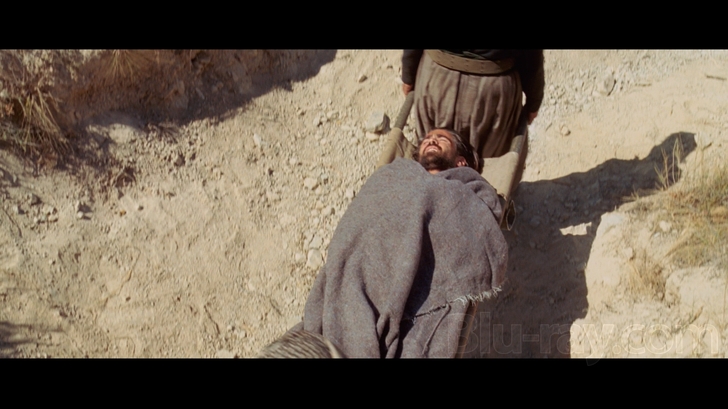
Several above average (SD) supplements are included on Triage:
- Making of 'Triage' (19:37) documents the six year effort of director Tanovic to bring the project to the screen;
- B Roll Footage (9:49) offers some interesting behind the scenes on location shots;
- Soundbites (27:10) is a series of snippets of interviews (some segments of which are included in the other featurettes) with all of the principal actors as well as director Tanovic.
Triage Blu-ray Movie, Overall Score and Recommendation 
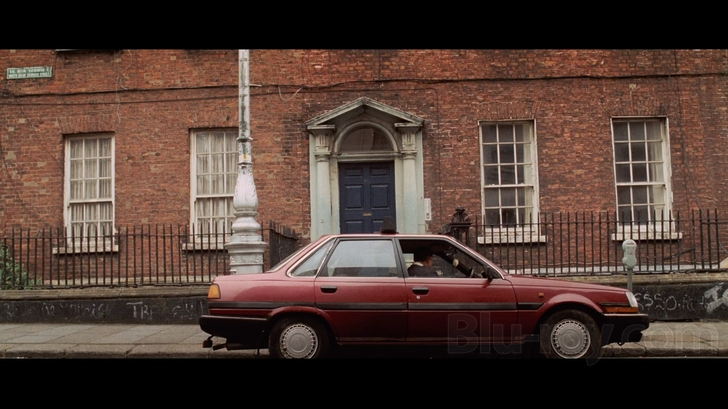
As a psychological portrait of wounded soul, Triage may fall a bit short in the logic department. As a blistering indictment of the emotional havoc war can wreak on individuals, it's a powerful and compelling film, well directed and superbly performed. Triage is certainly not an easy film to sit through, but it delivers an emotional wallop that makes it easily highly recommended.
Similar titles
Similar titles you might also like

Adam Resurrected
2008

Generation Kill
2008

Paths of Glory
1957

The Deer Hunter 4K
Collector's Edition
1978

Lebanon
2009

Punishment Park
1971

Jarhead
2005

The Master
2012

The Bridge on the River Kwai
1957

Wings
1927

The Thin Red Line
1998

Apocalypse Now 4K
Final Cut | 40th Anniversary Edition
1979

The Big Parade
Warner Archive Collection
1925

The Dirty Dozen
1967

In the Land of Blood and Honey
2011

M*A*S*H
1970

Cross of Iron
1977

Merry Christmas Mr. Lawrence
1983

Beasts of No Nation
2015

American Pastoral
2016
